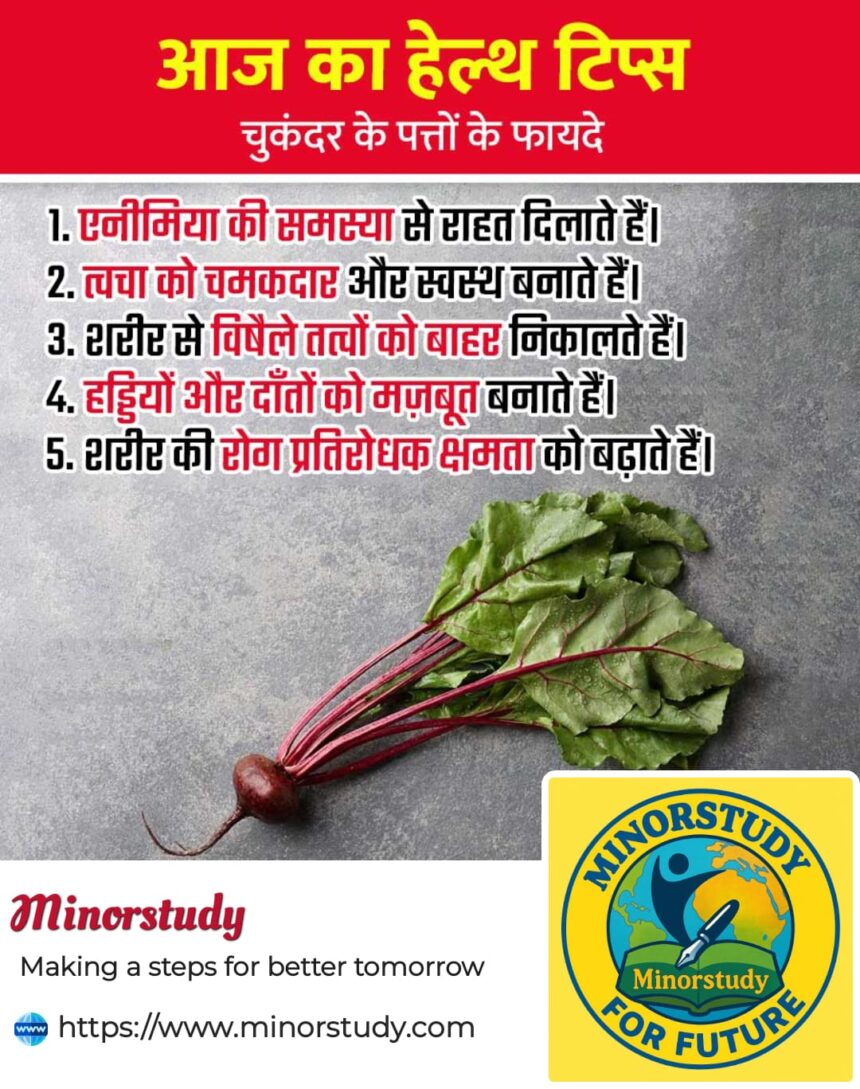Powerful Benefits of Beetroot Leaves – Nature’s Hidden Miracle for Glowing Health”
🩺 Introduction: The Hidden Healer in Your Kitchen Garden
In the colorful world of vegetables, beetroot often takes the spotlight for its rich red color and multiple health benefits. But did you know that beetroot leaves (beet greens) are even more nutrient-dense and beneficial for your health than the root itself?
- 🩺 Introduction: The Hidden Healer in Your Kitchen Garden
- 📜 Historical Roots: Ancient Wisdom of Beetroot Leaves
- 🧪 Nutritional Composition of Beetroot Leaves
- 🌿 Timeline – Traditional to Modern Usage
- 🌟 7 Powerful Benefits of Beetroot Leaves
- 1. 🌡️ Relief from Anemia
- 2. ✨ Glowing and Healthy Skin
- 3. 🧼 Removes Toxic Elements from the Body
- 4. 🦴 Strengthens Bones and Teeth
- 5. 🛡️ Boosts Immunity
- 6. 🧠 Enhances Mental Clarity and Mood
- 7. 💪 Supports Weight Management and Gut Health
- 📚 FAQs – Your Questions Answered
- ❓ Are beetroot leaves edible?
- ❓ How should I cook beetroot leaves?
- ❓ Can children eat beetroot leaves?
- ❓ Do beetroot leaves taste bitter?
- ❓ How often can I eat them?
- 🪴 How to Include Beetroot Leaves in Your Diet
- 🎉 Cultural & Societal Importance
- 💬 Wishing Message & Positive Thought
- 🧩 Key Takeaways
- 🏁 Conclusion – Don’t Waste This Wonder Leaf!
Often discarded or overlooked, these vibrant green leaves are packed with vitamins, minerals, antioxidants, and healing properties that could improve your health dramatically. From curing anemia to making your skin glow, beetroot leaves are nothing less than a natural superfood.
In this comprehensive, human-friendly article, we’ll explore the history, science, significance, timeline, and societal impact of consuming beetroot leaves. We’ll also uncover the FAQs, facts, and daily life applications, making this read more than just information—it’s inspiration for transformation.
📜 Historical Roots: Ancient Wisdom of Beetroot Leaves
Beetroot and its greens have been cultivated since ancient Roman and Greek times, where it was praised not only as a vegetable but also as medicine.
Key Historical Facts:
Ancient Greeks used beet leaves as a cooling agent and digestive aid.
Ayurveda mentions leafy greens like beetroot as “Rakta vardhak” – blood enhancers.
In traditional Chinese medicine, beet greens were used to detoxify the liver and strengthen internal Qi (energy).
🧪 Nutritional Composition of Beetroot Leaves
| Nutrient | Value (per 100g) | Health Benefit |
|---|---|---|
| Vitamin A | 316% of Daily Value (DV) | Boosts eye health, skin glow |
| Vitamin C | 50% of DV | Strengthens immunity |
| Iron | 15% of DV | Prevents anemia |
| Calcium | 11% of DV | Strengthens bones |
| Magnesium | 20% of DV | Regulates muscle and nerve function |
| Fiber | 3.7g | Supports digestion |
🌿 Timeline – Traditional to Modern Usage
| Era | Key Usage |
|---|---|
| Ancient Rome | Used in meals and herbal remedies |
| Ayurveda (1000 BC onwards) | Detoxification, blood purification |
| 19th Century | Prescribed for women with low iron levels |
| 20th Century | Added to herbal teas, salads, and soups |
| Present Day | Re-emerging as a superfood in global nutrition |
🌟 7 Powerful Benefits of Beetroot Leaves
1. 🌡️ Relief from Anemia
Beetroot leaves are rich in iron, folate, and vitamin C—essential for hemoglobin production. Consuming them regularly can naturally boost red blood cell count and help combat symptoms like fatigue and dizziness.
Tip: Add sautéed beet greens with lemon to your lunch for better iron absorption.
2. ✨ Glowing and Healthy Skin
Loaded with Vitamin A and antioxidants, beet greens detoxify the blood and cleanse the skin, reducing acne, dullness, and blemishes. It also slows down premature ageing.
“Beauty begins in the gut, and beet greens are your skin’s silent partner.”
3. 🧼 Removes Toxic Elements from the Body
The chlorophyll and fiber in beet leaves work as natural detoxifiers, cleansing the liver and digestive tract. It helps flush out toxins, improves digestion, and balances the pH levels in the body.
Start your day with a beetroot leaves smoothie and feel lighter!
4. 🦴 Strengthens Bones and Teeth
Beet greens are rich in Calcium, Magnesium, Vitamin K, and Potassium, which together make bones stronger and denser, and prevent osteoporosis and tooth decay.
A must-have for growing kids and elderly!
5. 🛡️ Boosts Immunity
Beetroot leaves contain Vitamin C, which helps in WBC production, strengthening the immune system to fight against seasonal infections, colds, and viral attacks.
During flu season, a bowl of beet greens soup is your best friend.
6. 🧠 Enhances Mental Clarity and Mood
Magnesium and Iron work synergistically to promote oxygen flow to the brain, which enhances cognitive ability, focus, and mental calmness. Beet greens also contain beta-carotene, known to uplift mood.
7. 💪 Supports Weight Management and Gut Health
High in fiber, low in calories, and rich in digestive enzymes, beetroot leaves help curb appetite, improve gut flora, and ensure smooth bowel movements.
A perfect food for those on a weight-loss or detox plan.
📚 FAQs – Your Questions Answered
❓ Are beetroot leaves edible?
✅ Absolutely. They’re 100% edible, delicious, and nutritious.
❓ How should I cook beetroot leaves?
✅ You can steam, sauté, boil, or use them in soups, curries, smoothies, or salads.
❓ Can children eat beetroot leaves?
✅ Yes, they are safe and beneficial for children, especially for bone growth and immunity.
❓ Do beetroot leaves taste bitter?
✅ When cooked properly with spices or lemon, the bitterness reduces and it becomes flavorful.
❓ How often can I eat them?
✅ 2–3 times a week is ideal to reap the maximum benefits.
🪴 How to Include Beetroot Leaves in Your Diet
Sauté with garlic and olive oil for a quick side dish.
Add to dal or sambar for an earthy flavor.
Use in green smoothies with banana or apple.
Prepare beet greens soup with cumin and turmeric.
Stir into pasta or quinoa bowls as a topping.
🎉 Cultural & Societal Importance
In many rural Indian households, no part of a vegetable is wasted. Beetroot leaves are used in traditional dishes like:
“Saag” in North India
“Thoran” in Kerala
“Palya” in Karnataka
“Shaak” in Gujarat
Their re-emergence reflects the sustainable, waste-free lifestyle our ancestors practiced.
💬 Wishing Message & Positive Thought
“May your health bloom like beetroot greens – naturally strong, deeply rooted, and gloriously vibrant.”
“Start small, start green – your kitchen garden might be hiding the cure you’re seeking.”
🧩 Key Takeaways
Beetroot leaves are nutritional powerhouses, far beyond just “waste.”
They offer 7+ healing benefits, especially for skin, immunity, bones, and digestion.
Easily available, affordable, and sustainable.
Perfect addition to modern health-conscious lifestyles.
🏁 Conclusion – Don’t Waste This Wonder Leaf!
We often throw away beetroot leaves, not realizing that we are discarding nature’s green gold. With their unmatched nutritional profile and ancient wisdom-backed healing properties, they deserve a place of honor in your meals.
Next time you buy beetroot, embrace the whole gift. Your body—and the environment—will thank you.








